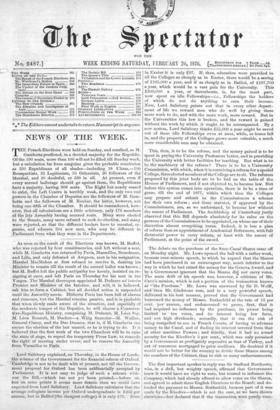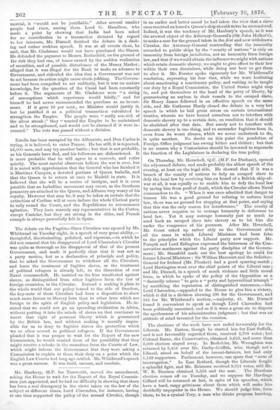The first important speaker in reply was Sir Stafford Northcote,
who, in a dull, but weighty speech, affirmed that Government knew it would have no right to vote, but trusted to influence the Company, which bad already offered to allow votes on the Shares, and agreed to admit three English Directors to the Board; and de- fended the payment to Messrs. Rothschild, because part of it was made by the Khedive—which is not the case, as we have shown elsewhere—but declared that if the transaction were purely coin-
mercial, it "would not be justifiable." After several smaller people had risen, among them Lord G. Hamilton, who made a point by showing that India had been asked for no contribution to a transaction dictated by regard to her interests, Mr. Disraeli finished the debate in a dash- ing and rather reckless speech. It was at all events clear, he said, that Mr. Gladstone would not have purchased the Shares. He defended the payment to Messrs. Rothschild, on the ground of the risk they had run, of losses caused by the sudden realisation of securities, and of possible disturbance of the Money Market ; alleged that it was illegal for the Bank to make an advance to Government, and ridiculed the idea that a Government was not to act because its action might cause stock-jobbing. The Govern- ment had been compelled to act suddenly, but it was on mature knowledge, for the question of the Canal had been constantly before it. The arguments of Mr. Gladstone were " a string of assumptions which experience would falsify," and for himself he had never recommended the purchase as an invest- ment. If it gave 10 per cent., no Minister would justify it, but he justified it as a political transaction calculated to strengthen the Empire. The people were " really sea-sick of the silver streak ;" they " wanted the Empire to be maintained and to be strengthened, and would not be alarmed if it were in- creased." The vote was passed without a division.



































